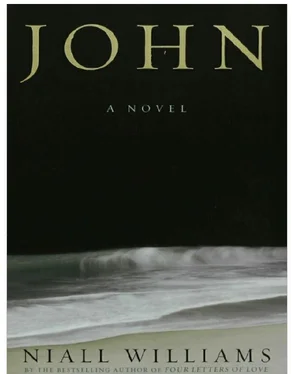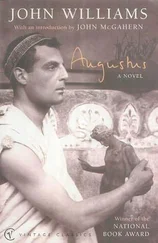'Stay out, Papias.'
'You will feel better if you come into the air. When we come to Ephesus, all will be better. We will have proper dwelling. Real walls,' Papias says, smiling, touching his hand to the mud and stick overhead.
'Stay out!'
'I am only come to help you collect the papyri.'
'It is done. They are all collected. I will leave them by the entrance. You can take them when you sail. I am not coming to Ephesus.'
'We are all going.'
'Not I.'
Simon's eyes are fixed on the faraway. He does not incline his head toward the youth, but considers instead the truth that is before him said aloud in words for the first time.
'But why? Brother Simon, the persecution is lifted, the banishment over. The time of glory for our Lord is here. We go to glory. To Ephesus. To begin the great work. You cannot stay on Patmos.'
'Nonetheless, I shall. I shall remain here and die like Prochorus.' He raises a hand. The sleeve of his robe falls back, and in the half-light Papias can see his hand and arm are bedded with sores. His neck, too, where one side turns, reveals a raised canker black and bubbled.
Involuntarily, Papias brings his hand to his mouth.
Simon nods. 'It is true. I have the plague that killed Prochorus. Though I kept myself from my good friend in all manner when he fell ill. Though I did not allow myself to touch his hand or pray by his side at his deathbed. Though I have lived in poor faith, always fearful for my own health. Nonetheless, I have it. I must remain here. Go and tell the Master.'
Papias does not move.
'Go and tell him.' Simon waves a hand, and now Papias can make out its gnarled form, long incisions where itching has grown intolerable and wounds opened with dark, lumpish gristle. The youth cannot breathe. Fear and guilt stop him.
'Go, Papias. Go with God.'
'We will not let you stay, Simon,' he blurts out. 'In Ephesus there will be healing, there will be cures, food, shelter. You will recover.'
'I will not risk you all by coming with you. It is decided. Go.'
Papias is bewildered. He looks at the bald-headed figure as though he is part of a puzzling dream, a design that does not fit. How can this be? How does this have meaning?
'Go. Be not troubled, young Papias. I am at peace.'
But Papias is troubled. 'We go to Ephesus to begin our great mission,' he says. 'You must be with us.'
'I will remain here. Truly. Only my blessing will go with you.'
'But. .'
'Good Papias. Go lest you take this plague from me. My prayers are only that those who sat to my sides at communion, Ioseph and Danil, are spared.'
'I will go and tell the Master,' Papias says at last. 'But you will be coming with us. We will not leave you.' He turns out into the day and draws a deep breath. His forehead is beaded. He blinks at the light. Below, the sea glistens. On the foreshore are Ioseph and the Apostle, and at once he takes off to race down toward them, spinning stones from underfoot, hurrying down the curved pathway until he meets the sand soft then hard and calls out into the wind.
Ioseph and John stand, and when Papias arrives to them, he breathlessly gasps, 'Simon is ill. He will not come. He says it is the disease of Prochorus. I saw his sores.'
The sea sighs. The waves collapse and come to their feet.
'Say again,' Ioseph says, 'and slowly.'
And Papias does and Ioseph bows his head and holds it so in silence some moments, as though his spirit absorbs a blow.
'He fears for you and Danil,' Papias says to Ioseph, looking at where John's hand lies on the old disciple's arm for guidance. 'He fears a contagion that would kill us all if he came to Ephesus.'
The three stand on the shore. John does not remove his hand from the elder's arm.
'I will go and reason with him,' Ioseph says at last.
Papias is flush-faced and agitated. 'He will not allow it. He is resolved. And. .' He presses his lips tightly together. As if to hear the unspoken, John turns his face toward him.
'And?' Ioseph asks.
Papias shakes his head. He will not say before the Apostle. But John says simply, 'Tell.'
'What if it is true? What if he carries the disease? What if it is on his flesh, in his very breath? What if we bring him with us and we come to Ephesus plagued? Though I love Brother Simon and all who are our community. .'
'Yes, Papias?'
He knows he has spoken rashly. The sign of it is in his cheeks, in the wideness of his eyes. He lowers his head.
'Papias is right,' Ioseph says, 'Simon must stay.' A tall wave unfurls, slowly falling, then he adds, 'And I with him.' His voice is calm. 'I will remain and attend him until the disease passes or takes us both.'
Once Ioseph has said it, all three know it will be so. It falls out as if by natural decree, as if such bonds of love and selflessness are written in air and await only discovery. Ioseph turns to the blind apostle, whom he has known and followed a lifetime. By the sleeve hem of his robe he begins to lift the arm that lays on his and to place it instead on Papias. But John raises both of his hands and leans forwards, reaching till he finds the face of his old friend.
He says nothing. He holds the face in his hands. The wind lifts and lets fall the thin strands of his white hair. Ioseph bows his head. The sea breaks in foam.
When at last Ioseph steps back from the embrace, he bends forward and kisses the sleeve of the Apostle's robe, and, leaving him with Papias, he goes along the shoreline to the stone-way that leads to Simon.
Later, John sits by the cave entrance. Papias attends him. Meletios and Danil have been instructed to gather what things they will not need and bring these to the fisher families on the far shore. They come and go from the cave. What will they need after all? What lies ahead is for each differently imagined. They have lived so long on the island, the greater world has fallen away, first into memory, and then into the shifting domain of dreams. The world they keep with them is the one of childhood. The dust of summer in Judea. The streets of Jerusalem, the shadowed cool by the synagogue, running fleet and barefoot past the merchants' stalls. It is a world from before hearing the Word, before each of their lives were stopped and turned about. In silence and exile on Patmos, almost all had to let go the grief of their days before banishment, the spitting, the name calling, the stones. Each, through dream and prayer and will, had to come to a place of understanding whereby suffering and persecution were part of the Lord's plan, where the ignorance and scorn of the world made it easier to leave it. And leave they had. On the island the world was elsewhere. In the first years of Danil's dreams his narrow jaws ground together until he had a vision of wings sprouting at his ankles and moving him three feet above the ground. He woke and understood they were to live now between heaven and earth, and he lost all resentment of banishment. To Meletios the island took on the form of a great ship pulling away from the shore and sailing on through day and night toward a New Jerusalem always just beyond the horizon. Lemuel, bald-headed and genial, smiled at this. 'The world is light and dark, is day and night rising and falling over us. What need have we of any other world? This place is all places,' he had told Papias. 'Why need we ever leave?'
And so, variously, they had each come to acceptance, and even gratitude. Their prison had become a sanctuary. And now that John has spoken, not all feel, as young Papias, the glory of the return.
Meletios takes a wooden table and Danil stools from the cave across the upper plane of rock. They do not voice dissent, nor even consider it. But yet there is a shadow. What will it be like to leave? The island, bare and harsh in winter, has become a part of them, and the world at Ephesus that now awaits is unknown. Is it perhaps better to remain like Ioseph, even to die there? The Roman lifting of banishment does not mean hatred of them will be gone. Hearts will not have changed, only laws.
Читать дальше










